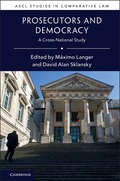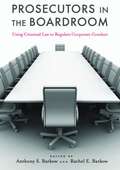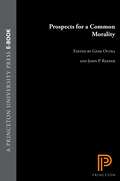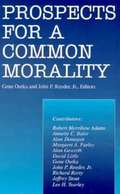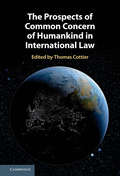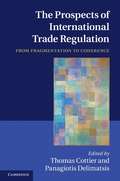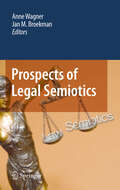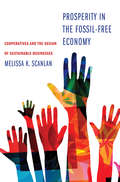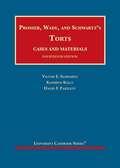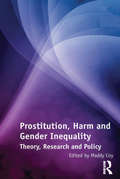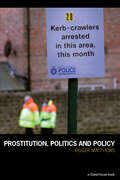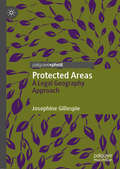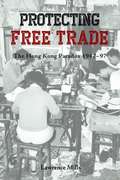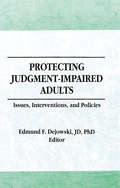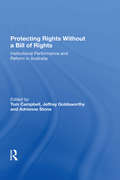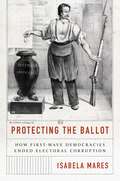- Table View
- List View
Prosecutors and Democracy: A Cross-National Study (ASCL Studies in Comparative Law)
by Máximo Langer Sklansky David AlanFocusing squarely on the relationship between prosecutors and democracy, this volume throws light on key questions about prosecutors and what role they should play in a democracy. Internationally distinguished scholars discuss how prosecutors can strengthen democracy, how they can undermine it, and why it has proven so challenging to hold prosecutors accountable while insulating them from politics. Drawing on experiences from the United States, the UK and continental Europe, the contributors show how different legal systems have addressed that challenge in very different ways. Comparing and contrasting those strategies allows us to assess their relative strengths - and to gain a richer understanding of the contested connections between law and democratic politics. Chapters are in explicit conversation with each other, showing how each author's perspective informs, or differs from, that of the others. This is an ideal resource for legal scholars and reformers, political philosophers, and social scientists.
Prosecutors in the Boardroom: Using Criminal Law to Regulate Corporate Conduct
by Rachel E. Barkow Anthony S. BarkowWho should police corporate misconduct and how should it be policed? In recent years, the Department of Justice has resolved investigations of dozens of Fortune 500 companies via deferred prosecution agreements and non-prosecution agreements, where, instead of facing criminal charges, these companies become regulated by outside agencies. Increasingly, the threat of prosecution and such prosecution agreements is being used to regulate corporate behavior. This practice has been sharply criticized on numerous fronts: agreements are too lenient, there is too little oversight of these agreements, and, perhaps most important, the criminal prosecutors doing the regulating aren't subject to the same checks and balances that civil regulatory agencies are. Prosecutors in the Boardroom explores the questions raised by this practice by compiling the insights of the leading lights in the field, including criminal law professors who specialize in the field of corporate criminal liability and criminal law, a top economist at the SEC who studies corporate wrongdoing, and a leading expert on the use of monitors in criminal law. The essays in this volume move beyond criticisms of the practice to closely examine exactly how regulation by prosecutors works. Broadly, the contributors consider who should police corporate misconduct and how it should be policed, and in conclusion offer a policy blueprint of best practices for federal and state prosecution.Contributors: Cindy R. Alexander, Jennifer Arlen, Anthony S. Barkow, Rachel E. Barkow, Sara Sun Beale, Samuel W. Buell, Mark A. Cohen, Mariano-Florentino Cuellar, Richard A. Epstein, Brandon L. Garrett, Lisa Kern Griffin, and Vikramaditya Khanna
Prospects for a Common Morality
by Gene Outka and John P. ReederThis volume centers on debates about how far moral judgments bind across traditions and epochs. Nowadays such debates appear especially volatile, both in popular culture and intellectual discourse: although there is increasing agreement that the moral and political criteria invoked in human rights documents possess cross-cultural force, many modern and postmodern developments erode confidence in moral appeals that go beyond a local consensus or apply outside a particular community. Often the point of departure for discussion is the Enlightenment paradigm of a common morality, in which it is assumed that certain unchanging beliefs inhere in the structure of human reason. Whereas some thinkers continue to defend this paradigm, others modify it in diverse ways without abandoning entirely the attempt to address a universal audience, and still others jettison virtually all of its distinguishing features. Exhibiting a range of positions Western participants take in these debates, this volume seeks to advance the substance of the debates themselves without prejudging the outcome. Rival assessments of the Enlightenment paradigm are offered from various philosophical and theological points of view. In addition to the editors, the contributors include Robert Merrihew Adams, Annette C. Baier, Alan Donagan, Margaret A. Farley, Alan Gewirth, David Little, Richard Rorty, Jeffrey Stout, and Lee H. Yearley.
Prospects for a Common Morality
by John P. Reeder Gene Outka<p>This volume centers on debates about how far moral judgments bind across traditions and epochs. Nowadays such debates appear especially volatile, both in popular culture and intellectual discourse: although there is increasing agreement that the moral and political criteria invoked in human rights documents possess cross-cultural force, many modern and postmodern developments erode confidence in moral appeals that go beyond a local consensus or apply outside a particular community. Often the point of departure for discussion is the Enlightenment paradigm of a common morality, in which it is assumed that certain unchanging beliefs inhere in the structure of human reason. Whereas some thinkers continue to defend this paradigm, others modify it in diverse ways without abandoning entirely the attempt to address a universal audience, and still others jettison virtually all of its distinguishing features. <p>Exhibiting a range of positions Western participants take in these debates, this volume seeks to advance the substance of the debates themselves without prejudging the outcome. Rival assessments of the Enlightenment paradigm are offered from various philosophical and theological points of view. In addition to the editors, the contributors include Robert Merrihew Adams, Annette C. Baier, Alan Donagan, Margaret A. Farley, Alan Gewirth, David Little, Richard Rorty, Jeffrey Stout, and Lee H. Yearley.</p>
Prospects in International Investment Law and Policy
by Roberto Echandi Pierre SauvéThe negotiation of a patchy but burgeoning network of international investment agreements and the increasing use to which they are put is generating a growing body of jurisprudence which, while still evolving, requires closer analytical scrutiny. Drawing on many of the most distinguished voices in investment law and policy, and offering novel, multidisciplinary perspectives on the rapidly evolving landscape shaping international investment activity and treaty-making, this book explores the most important economic, legal and policy challenges in contemporary international investment law and policy. It also examines the systemic implications flowing from frenetic recent judicial activism in investment matters and advances several innovative propositions for how best to promote greater overall coherence in rule-design, treaty use and policy making and thus offer a better balance between the rights and obligations of international investors and host states.
The Prospects of Common Concern of Humankind in International Law
by Zaker AhmadThe Common Concern of Humankind today is central to efforts to bring about enhanced international cooperation in fields including, but not limited to, climate change. This book explores the expression's potential as a future legal principle. It sets out the origins of Common Concern, its differences to other common interest legal principles, and expounds the potential normative structure and effects of the principle, applying an approach of carrots and sticks in realizing goals defined as a Common Concern. Individual chapters test the principle in different legal fields, including climate technology diffusion, marine plastic pollution, human rights enforcement, economic inequality, migration, and monetary and financial stability. They confirm that basic obligations under the principle of 'Common Concern of Humankind' comprise not only that of international cooperation and duties to negotiate, but also of unilateral duties to act to enhance the potential of public international law to produce appropriate public goods.
The Prospects of International Trade Regulation
by Panagiotis Delimatsis Thomas CottierFor a long time, the GATT led a life of its own as a self-contained regime. The evolution from tariff to non-tariff barriers brought about increasing overlaps with other regulatory areas. WTO rules increasingly interface with other areas of law and policy, including environmental protection, agricultural policies, labour standards, investment, human rights and regional integration. Against this backdrop, this book examines fragmentation in international trade regulation across a wide array of regulatory fields. To this end, it uses a conceptually coherent theoretical framework which is based on the effort to bring about greater coherence among different policy goals and fields, and thus to embed the multilateral trading system within the broader framework of international economics, law and relations. It will appeal to those interested in a forward-looking discussion of the most pressing issues of the international trade agenda.
Prospects of Legal Semiotics
by Anne Wagner Jan M. BroekmanThis book examines the progress to date in the many facets - conceptual, epistemological and methodological - of the field of legal semiotics. It reflects the fulfilment of the promise of legal semiotics when used to explore the law, its processes and interpretation. This study in Legal Semiotics brings together the theory, structure and practise of legal semiotics in an accessible style. The book introduces the concepts of legal semiotics and offers an insight in contemporary and future directions which the semiotics of law is going to take. A theoretical and practical oriented synthesis of the historical, contemporary and most recent ideas pertaining to legal semiotics, the book will be of interest to scholars and researchers in law and social sciences , as well as those who are interested in the interdisciplinary dynamics of law and semiotics.
Prosperity in the Fossil-Free Economy: Cooperatives and the Design of Sustainable Businesses
by Melissa K ScanlanA blueprint for creating sustainable businesses, emphasizing the power and potential of cooperative models Drawing on both her extensive experience founding and directing social enterprises and her interviews with sustainability leaders, Melissa Scanlan provides a legal blueprint for creating alternate corporate business models that mitigate climate change, pay living wages, and act as responsible community members, including Certified B Corps and benefit corporations. With an emphasis on cooperatives, this book reveals the power and potential of cooperating as a unifying concept around which to design social enterprise achieving triple bottom-line results: for society, the environment, and finance.
Prosser, Wade And Schwartz's Torts, Cases And Materials (University Casebook Ser.)
by Victor Schwartz Kathryn Kelly David PartlettThrough its excellence in scholarship, clarity, and ease of use, this casebook engages readers in critical thinking about tort law and its operation in modern social settings. It sets forth crisply-edited classic tort cases, new tort law trends, and nuances in developing case law that impact the law and its application in the real world. Principal cases are not discarded just for the sake of change but because new cases reflect important changes in the law and present current doctrine in insightful and highly effective ways. The casebook goes beyond judicial decisions and includes key tort centered legislation and comparative perspectives where relevant. The casebook encourages the student to understand the English and American common law foundations of Tort law and to debate modern trends within various policy prescriptions. Unbiased in its approach and organized in manageable sections of information, the casebook is a superb tool for productive and stimulating classroom debate. The authors are an outstanding combination of respected scholars and practitioners. They have worked as a team since the 9th edition, published in 1994. Victor Schwartz was an Advisor on the first three sections of the Restatement (Third): Products Liability, Apportionment of Liability, and Physical and Emotional Harm. David Partlett is presently an Advisor on two new Restatements relating to liability for intentional torts and for defamation and privacy just established.
Prostitution, Harm and Gender Inequality: Theory, Research and Policy
by Maddy CoyProstitution, Harm and Gender Inequality brings together international research exploring the range of gendered harms to women involved in prostitution and the consequences of growth of the sex industry for global gender relations. While there is an increasing amount of research and academic output on prostitution, the current focus is often on discussion and critique of policy frameworks, and contemporary debates over harm are largely limited to sex trafficking and sexual exploitation of children. Less attention is paid to questions of how the sex industry perpetuates notions of objectification and male entitlement with respect to sexual access to women's bodies, despite being key feminist concerns for several decades. This position has become effectively marginalized, but the global growth and industrialization of the sex industry requires a return to these questions. Through exploring gendered inequality and re-engaging with an understanding of prostitution as harmful with impacts on the self and body that are experienced as abusive but do not always constitute violence, this book introduces a range of research and thinking, while also drawing on existing literature to explore the consequences of prostitution for women in the sex industry and wider gender relations. These issues are discussed with regard to: coercion and recruitment, including trafficking; notions of male entitlement in accounts of men who buy sex; critical interrogations of agency and choice; legal and policy frameworks; and representations of prostitution in popular culture.
Prostitution, Politics & Policy
by Roger MatthewsProstitution has become an extremely topical issue in recent years and attention has focused both on the situation of female prostitutes and the adequacy of existing forms of regulation. Prostitution, Politics & Policy brings together the main debates and issues associated with prostitution in order to examine the range of policy options that are available. Governments in different parts of the world have been struggling to develop constructive policies to deal with prostitution – as, for example, the British Home Office recently instigated a £1.5 million programme to help address the perceived problems of prostitution. In the context of this struggle, and amidst the publication of various policy documents, Prostitution, Politics & Policy develops a fresh approach to understanding this issue, while presenting a range of what are seen as progressive and radical policy proposals. Much of the debate around prostitution has been polarized between liberals – who want prostitution decriminalized, normalized and humanized – and conservatives – who have argued that prostitution should be abolished. But, drawing on a wide range of international literature, and providing an overview that is both accessible to students and relevant to policy makers and practitioners, Roger Matthews proposes a form of radical realism that is irreducible to either of these two positions.
Protagonists of Medicine
by Domenico RibattiThe study of medical history is interesting in itself and may help to modify the view sometimes expressed that medical students and doctors are lacking in culture of any sort. Moreover, some historical perspective is often advantageous when one is considering the multitude of advances that are now taking place in the theory and practice of medicine. This book, containing a series of collected papers concerning immunology and pathology and vascular biology and angiogenesis, drives us through scientific milestones in the history of medicine in the course of the past two centuries and highlights the contribution of pioneering scientists whose discoveries have paved the way to many researchers working in the fields of cell biology, developmental biology, immunology, pathology, and oncology. This book will serve as a resource for scientists, historians of medicine and philosophers of science and medicine.
Protected Areas: A Legal Geography Approach
by Josephine GillespieThis book argues that legal geography provides new insights into contemporary conservation challenges. Despite unprecedented efforts, we are facing an extinction crisis, and in situ protected area programs are falling short. This book discusses the protected area phenomenon and calls for changes to current approaches, informed by legal geography –an inter-disciplinary area focused on the intertwined people–place–law dynamics that enable, or disable, effective management practices. The book examines two protected area types: World Heritage Sites, where places of ‘outstanding universal value’ are protected for all humanity, and Ramsar protected wetland sites, one of the first global environmental protection initiatives. Using case studies from the Australasian region (Australia, the Pacific and Southeast Asia), it reveals how current approaches can be improved by taking into account the people–place–law nexus embedded in legal geography research.
Protecting Built Heritage in Hong Kong (SpringerBriefs in Law)
by Steven Brian GallagherThis Brief is the first comprehensive coverage of law and policy intended to protect built heritage in Hong Kong. Although characterized as a city of skyscrapers and modernity, Hong Kong has a rich cultural heritage and a surprisingly rich built heritage. The text considers what “built heritage” means in Hong Kong and what built heritage there is in Hong Kong. It introduces general readers, practitioners and students to the issues facing built heritage protection and how such protection usually develops in a modern city. In particular, it considers the problems and disputes that provided the focus for development of law and policy in Hong Kong, especially the legacy of 150 years as a British colony and the consequent identification as a “borrowed” and “temporary” place. The Brief considers how effective law and policy has been in protecting built heritage under the colonial and post-colonial administrations- their successes and failures. These include the Kowloon-Canton Railway Station, the Antiquities and Monuments Ordinance, reclamation of Victoria Harbour, violent protests at Queen’s Pier, and the introduction of mandatory heritage impact assessments for government projects. The text concludes noting recent successes, which may indicate a brighter future for the protection of Hong Kong’s built heritage.
Protecting Creativity in Fashion Design: US Laws, EU Design Rights, and Other Dimensions of Protection (Routledge Research in Fashion Law)
by Susanna MonseauExploring the debate over the benefits of legal protection for fashion design, this book focuses on how a combination of minimal legal protections for design, evolving social norms, digital technology, and market forces can promote innovation and creativity in a business known for its fast-paced remixing and borrowing. Focusing on the advantages and disadvantages of the main US and EU IP laws that protect fashion design in the world’s biggest fashion markets, it describes how recent US case law in copyright and trademark cases has led to misaligned incentives for the industry and a lack of clear protection, while, in the EU, the CJEU’s interpretation of the pan-European design rights system has created significant overlap with copyright law and risks, leading to the overprotection of design. The book proposes that creativity and innovation in fashion derive some benefit from a limited unregistered design right protection, and that cumulation with copyright protection is unhelpful. It also proposes that there is a larger role for developing social norms relating to sustainability, the ethics of cultural appropriation, and the online shaming of counterfeiters that can also help create a fair equilibrium between protection and borrowing in fashion design.
Protecting Free Trade
by Lawrence MillsProtecting Free Trade is the story of a paradox that both limited and stimulated Hong Kong's post-war economy. In order to preserve its access to open markets, Hong Kong was obligated by international agreements to accept restraints on its exports; and in order to sustain growth, Hong Kong had to subject its largest industry — textiles — to a massive network of restrictions. Protecting Free Trade examines how Hong Kong handled, by negotiation, attempts by developed economies to limit international trade through protective measures. The central argument is that, far from stifling Hong Kong's industry, restrictive international trade agreements became a stimulus for economic success by creating a sellers' market in which Hong Kong was the dominant supplier. The book is also a personal memoir by someone who was deeply involved in policy formulation. Lawrence Mills was deeply involved in many of the critical economic issues that Hong Kong faced in the 50 years leading up to its return to China in 1997. In Protecting Free Trade he tells the inside story of how Hong Kong held on to its vulnerable and volatile role as a global centre of trade, despite the constant pressures to limit its exports, and its sometimes fractious relationships with the UK, the USA, and Europe. He illustrates the political savvy with which negotiators distanced Hong Kong from the UK to gain the support of developing countries as a countervailing force in international trade, but not to an extent that might upset China. He explains why, for the strategic defence of its interests, Hong Kong depended on international trade arrangements and bilateral restraint agreements. Protecting Free Trade also examines the role of the Trade and Industry Departments, which Mills headed, and of their principal advisory boards. It details the bureaucratic systems, including controversial quota controls, that were necessary to give Hong Kong's businessmen stability and room for manoeuvre in fast-evolving markets. Mills also assesses the charge that the department was too close to the constituency that it served.
Protecting Human Rights in the EU: Controversies and Challenges of the Charter of Fundamental Rights
by Tanel KerikmäeHuman rights are much talked about and much written about, in academic legal literature as well as in political and other social sciences and the general political debate. This book argues that the universality of basic human rights is one of the values of the concept of rights. It points out the risk of a certain "inflation" caused by the current habit of talking so much and so often about human rights and of using them as a basis for claims of various kinds. These rights, their understanding and interpretation may need to become more "purist" to ensure that universal human rights as a concept survive. Another chapter concentrates on the analysis of the frames of "EU protected human rights" from the perspective of effective implementation. Further, the book not only deals with the complicated relations between the EU and international law, but also seeks to show the horizontal effect. To that end, the fears and hopes of the member states and interest groups are categorized and commented on. Lastly, the gaps in theory and practice are addressed, current trends related to implementation are pointed out, and suggestions are made concerning how to make the best out of the Charter.
Protecting Intellectual Property in the Arabian Peninsula: The GCC states, Jordan and Yemen (Routledge Research in Intellectual Property)
by David Price Alhanoof AlDebasiThis work examines the endeavours of the Arabian Peninsula States – namely the Gulf Cooperation Council member States of Bahrain, Kuwait, Oman, Qatar Saudi Arabia and the UAE, as well as Jordan and Yemen as prospective GCC members – in establishing national intellectual property protection regimes which both meet their international treaty obligations and are also congruent with their domestic policy objectives. It uses the WTO’s TRIPS Agreement of 1995 as the universal benchmark against which the region’s laws are assessed. The challenges faced by the States in enforcing their intellectual property laws receive particular attention. Protecting Intellectual Property in the Arabian Peninsula considers the changing nature of the States’ intellectual property laws since 1995. It argues that the decade immediately following the TRIPS Agreement was marked by a period of foreign forces shaping or influencing the character of the States’ intellectual property legislative regimes, primarily through multilateral or bilateral trade-based agreements. The second and current decade, however, see a significant shift away from foreign influences and a move towards domestic and regional imperatives and initiatives taking over. The work also examines regional initiatives for the protection of traditional knowledge and cultural heritage, as areas of intellectual property which fall outside the parameters of the TRIPS Agreement, but which are of significant concern to the States and other developing countries, and to which they are giving increasing attention in terms of providing proper protection.
Protecting Judgment-Impaired Adults: Issues, Interventions, and Policies
by Edmund F DejowskiThis thorough book provides valuable information on guardianship and alternative methods for serving judgment-impaired adults. To date, much of contemporary guardianship policy has been developed by “muddling through.” This book explores developments in case law concerning the scope of the guardian's authority, the proposed national guardianship act, and proposed changes in federal legislation regarding representative payees, and provides guidance in these important areas of concern.
Protecting National Security: A History of British Communications Investigation Regulation
by Phil GloverThis book contends that modern concerns surrounding the UK State’s investigation of communications (and, more recently, data), whether at rest or in transit, are in fact nothing new. It evidences how, whether using common law, the Royal Prerogative, or statutes to provide a lawful basis for a state practice traceable to at least 1324, the underlying policy rationale has always been that first publicly articulated in Cromwell’s initial Postage Act 1657, namely the protection of British ‘national security’, broadly construed. It further illustrates how developments in communications technology led to Executive assumptions of relevant investigatory powers, administered in conditions of relative secrecy. In demonstrating the key role played throughout history by communications service providers, the book also charts how the evolution of the UK Intelligence Community, entry into the ‘UKUSA’ communications intelligence-sharing agreement 1946, and intelligence community advocacy all significantly influenced the era of arguably disingenuous statutory governance of communications investigation between 1984 and 2016. The book illustrates how the 2013 ‘Intelligence Shock’ triggered by publication of Edward Snowden’s unauthorized disclosures impelled a transition from Executive secrecy and statutory disingenuousness to a more consultative, candid Executive and a policy of ‘transparent secrecy’, now reflected in the Investigatory Powers Act 2016. What the book ultimately demonstrates is that this latest comprehensive statute, whilst welcome for its candour, represents only the latest manifestation of the British state’s policy of ensuring protection of national security by granting powers enabling investigative access to communications and data, in transit or at rest, irrespective of location.
Protecting Privacy in China
by Hao WangToday, privacy is one of the most hotly debated topics worldwide. The book aims to balance the development of personal rights in a country that has historically valued collective rights over those of the individual. The protection of privacy is not an issue that has been emphasised during the rapid development of economic laws in China. However, the accompanying development of greater government-based regulation of these laws' implementation has led to greater invasions of personal privacy. This study attempts to provide a way forward for China to address the ever-increasing concerns about the protection of privacy and puts forward a legislative model for protection. This is achieved after a thorough analysis of the threats to privacy protection in China, a critical evaluation of the level of current privacy protection in China, and an analysis of the privacy laws in a series of developed nations based on common law and civil law.
Protecting Rights Without a Bill of Rights: Institutional Performance and Reform in Australia (Law, Justice And Power Ser.)
by Jeffrey GoldsworthyAustralia is now the only major Anglophone country that has not adopted a Bill of Rights. Since 1982 Canada, New Zealand and the UK have all adopted either constitutional or statutory bills of rights. Australia, however, continues to rely on common law, statutes dealing with specific issues such as racial and sexual discrimination, a generally tolerant society and a vibrant democracy. This book focuses on the protection of human rights in Australia and includes international perspectives for the purpose of comparison and it provides an examination of how well Australian institutions, governments, legislatures, courts and tribunals have performed in protecting human rights in the absence of a Bill of Rights.
Protecting Societal Interests in Corporate Takeovers: A Comparative Analysis of the Regulatory Framework in the U.K., Germany and China
by Huizi AiThe book explores “what are the societal interests that may be affected by a takeover, are these protected under the current regulatory frameworks of the U.K., Germany, and China, (and if so) how are they protected and what recommendations can be made for future reforms in the three jurisdictions?” The book adopts three main methods: law and economics analysis, doctrinal legal research, and comparative analysis.The content of this book is intended not only for the academia; it may also benefit the policy makers by providing an evaluation on the strengths and weaknesses of different protection mechanisms and recommendations for future reforms. Besides, companies which are (potentially) interested in conducting takeovers in the three countries may also find this book useful with its overall analysis of the regulatory frameworks and representative takeover cases in the jurisdictions.
Protecting the Ballot: How First-Wave Democracies Ended Electoral Corruption
by Isabela MaresHow reforms limiting electoral misconduct completed the process of democratizationBetween 1850 and 1918, many first-wave democracies in Europe adopted electoral reforms that reduced the incidence of electoral malfeasance. Drawing on analysis of parliamentary deliberations and roll-call votes in France, Germany, Belgium, and the United Kingdom, Protecting the Ballot explores how these electoral changes came about.Reforms limiting electoral malfeasance came in a variety of forms. Some reforms imposed harsher punishments for bribing or the politicization of state resources during campaigns. Other changes improved electoral secrecy, providing better protection of voters’ autonomy. By mandating the presence of candidate representatives supervising electoral operations, reforms also reduced the incidence of electoral fraud. Isabela Mares documents how elite splits facilitated the formation of parliamentary majorities in support of electoral reforms. The political composition of these majorities varied across countries and across issue area, depending on the distribution of political resources and the economic and electoral costs incurred by politicians with opportunities to engage in malfeasance. Unpacking the electoral determinants of the demand for reforms, Mares offers an alternative to theories of democratization that emphasize economic considerations alone.By studying the successful adoption of reforms limiting electoral irregularities in first-wave democratic transitions, Protecting the Ballot sheds light on the opportunities and obstacles for ending electoral wrongdoing in recent democracies.
